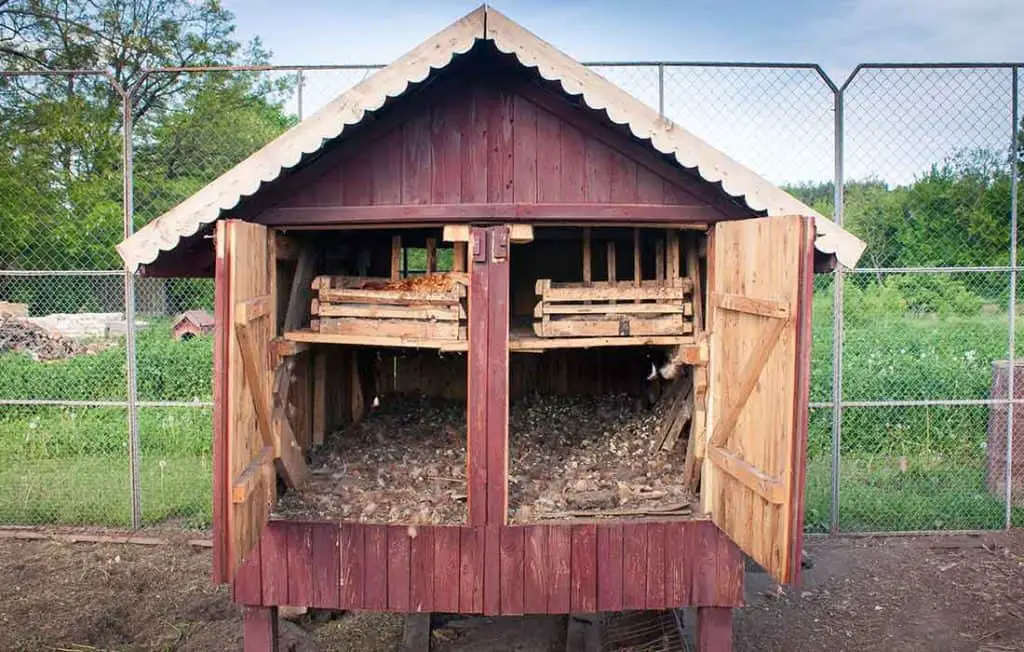Silkies are exotic-looking chickens that have a sweet nature. They’re typically smaller than other breeds of chickens and have five toes instead of four.
Kids usually love playing with silkies because they’re fun to be around. They make excellent garden pets, but can they be kept in the house? Keep on reading to learn more about silkies.
Can Silkies Be Kept In The House?
Because of their friendly demeanor, many people keep them as indoor pets. However, indoor chickens will require special care, access to the outdoors, a cage, bedding, etc., to stay comfortable. The downside is chickens can carry diseases and become in poor health when kept indoors.

If you’re reading this article, you’re considering getting Silkies or moving them indoors. We’ll share everything you need to know about keeping them inside and whether you should. We’ll also give you some tips should you want to keep one as an indoor pet.
*This page contains affiliate links to products I recommend. If you purchase something from this page, I may receive a small percentage of the sale at no extra cost to you.
But first, let’s look at whether you should keep them indoors.
Should You Keep Silkies In The House?
Although silkies are friendly chickens that you can easily take care of, they love to have continuous access to the sun and fresh air, just like all other chicken types. Keeping them inside the house might not be the best idea because they won’t feel healthy indoors.
You might need to keep a silkie inside the house if you’re raising one or two chickens, or if you live in a really cold or wet area, as Silkies can’t cope with wet weather well.
Building a coop for two chickens might not be that practical, and your chickens might not be safe.
Silkies, just like other chickens, are sociable creatures and need to interact with other chickens to lead a happy life. Below are various reasons why you should reconsider keeping them indoors.
Why Shouldn’t You Keep Silkies Indoors?
Below are some of the reasons you should reconsider keeping them indoors.
They Need Access to Vitamin D
All mammals need a regular dose of Vitamin D to keep them healthy. Vitamin D’s normal absorption is required to maintain normal levels of calcium, metabolism, and phosphorous.
A lack of vitamin D can lead to low-quality eggs and egg production decline, weak and ruffled feathers. Some may experience other health issues that will require medical care. (source)
Silkies Need Exercise
Silkies love to play in the grass and interact with other silkies. They will enjoy their time, playing and running around without bothering anyone. If you’re raising other breeds in your backyard, silkies might be bullied or even attacked by these larger breeds.
However, it isn’t impossible to raise Silkies with other chickens if you take the proper methods to integrate them.
Chickens Can Make People Sick
When kept in the house, chickens can make some people sick. Some people are allergic to feathers, and they might experience sneezing and coughing if from indoor chickens. While they don’t release as much dander as a dog, they are not hypoallergenic.
Some poultry can carry harmful germs that can causes illnesses, ranging from skin infections or worse.
They Poop Everywhere
Unless properly potty trained, chickens have a habit of popping everywhere. They’ll likely poop on your furniture, floors, carpets, and everywhere else in your home. You’ll even find poop covered eggs in the nesting boxes, whenever they lay eggs.
They produce far more waste than other “caged birds” like parrots, finches, etc.
People, especially children, should not be living with animal feces in the home.
According to Dr. Carolyn Hurwitz, a poultry specialist, “It’s never a good idea to have chickens living inside a house. You’re turning your home into a barnyard.”
It Will Make Them Unhappy
Silkies, like all birds, are happiest when they are allowed to live outside. Keeping them inside permanently prevents them from expressing their normal, natural behaviors.
Natural behaviors consist of scratching the ground and foraging for bugs, plants, and bugs, which is impossible to do while living indoors.
Can You Keep A Silkie Chicken Indoors? (Why People Do)
People’s opinions will vary on whether or not to keep Silkies indoors. However, several people do; even celebrities like Tori Spelling has an indoor Silkie.
Below are some main reasons people keep this breed indoors.
Bad Weather
If the weather is too cold, you might want to bring your silkies inside. You can keep them in a comfortable, warm coop, but if you’re going to bring them in for a day or two, that shouldn’t be a problem.
Snow can clump in their foot feathers and deprive them of walking comfortably. You should pay attention to your silkies, especially in frigid weather.
Companionship
Like dogs, Silkies have a great demeanor that makes them excellent pets. If tamed properly, you can cuddle, pet, and hold them like other domesticated pets.
Some people crave the companionship of a pet and will take their chickens with them everywhere they go. It’s not unheard of to buy a leash for your chicken, so they don’t run away.
How to Keep Silkies Indoors?

It’s not hard to find YouTube videos of Silkies living indoors. If you’ve already made up your mind that you’re going to keep them inside, you need to know how to care for them as an indoor pet.
Here’s what you need to raise an indoor Silkie.
Indoor Coop
You’ll need to invest in an excellent indoor coop. You’ll want to house your chickens in a proper enclosure away from living quarters. Ensure the cage is big enough to put their food, water, and bedding.
This Indoor Deluxe Large Wooden Chicken Coop is designed for indoor and outdoor use. The downside is you’ll have to ensure you have a lot of extra space for it.
Bedding or Litter
Chickens are smelly animals, so you’ll want some bedding that can be replaced every 1-2 days to keep your home smelling fresh. Many people have used Bermuda hay or mixed shavings for the inside of their coop.
Choose something inexpensive as you’ll need to replace it often. Silkies should not be allowed to sleep on wet bedding, as they can become very ill.
Chicken Diapers
Whether you’re bringing your chickens in for a day or more, you may want to consider getting them a chicken diaper. Chicken diapers are supposed to keep your home clean by catching the poo and pee of a chicken.
Whether or not they work is anybody’s guess. But many companies sell them for ducks, geese, chickens, and turkeys.
Food & Water
Keep their food and water in their cage during the day; this will prevent your dog or cat from eating it. While most pets won’t eat chicken feed, some pets are curious and eat some, which may cause them to become ill.
Like any other pet, an indoor chicken will need food and clean water daily.
Get a Second Silkie
Some people say you need to get a second Silkie to keep each other company. Chickens are social creatures and don’t do very well by themselves.
Ensure your chicken gets enough attention and isn’t left alone for hours on end. If you work a regular 9-5 job, you may want to consider getting a second Silkie. Self-employed people will be able to give their chicken the attention it needs.
Protect Your Furniture
Silkies can’t fly, but they may climb up on your furniture. Invest in coverings to protect your furniture from poop, feathers, etc.
You may want to spend time training your chicken on how to stay off your furniture. The easiest way to do this is never to put them on the furniture, even as babies.
Consider Moving Them to The Garage
Consider moving your Silkies to the garage? It will keep your home from smelling like a barnyard. Plus, you can put an outside dog door, so they can go outside into the yard and act like a chicken.
You won’t have to worry about them bringing bugs, dirt, and poo into your home after spending time outside.
At night, you can secure the dog door to prevent predators from coming into the garage and killing your chickens.
Wrap Up
Although you can keep a silkie in the house, it might not be the best idea. Just like other birds, silkies need regular access to fresh air, sunlight, and grass.
Unlike dogs and cats, Silkies will have many requirements that will make it difficult and time-consuming to give them a good quality of life indoors.
However, in cold weather, you might need to keep them inside the house if there is no safe coop to sleep comfortably. They’ll be fine to sleep indoors once in a while, as long as they are released outdoors when the sun comes up.
Final Word
